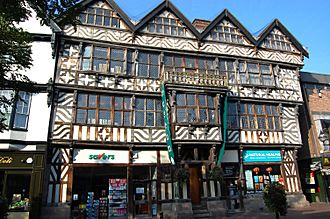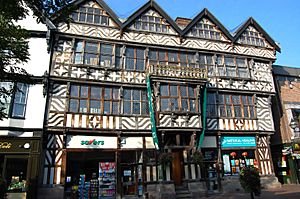Ancient High House facts for kids
Quick facts for kids Ancient High House |
|
|---|---|
 |
|
| General information | |
| Type | Town house |
| Architectural style | Timber framed |
| Town or city | Stafford |
| Country | England |
| Coordinates | 52°48′22″N 2°07′02″W / 52.8062°N 2.1172°W |
| Completed | 1595 |
| Client | Dorrington family |
The Ancient High House is a very old house in Stafford, England. It was built in 1595 by the Dorrington family. This house is made from local oak wood and is the biggest timber framed house in England.
Contents
History of the Ancient High House
The Ancient High House was built using a special method. The wooden frame was put together on the ground first. Each joint was numbered to make it easier to build the house on site. Some of the wooden pieces might have been used before in an even older building. This was common back then, and it's where the saying "up-sticks" (meaning to move house) comes from.
The English Civil War and King Charles I
During the English Civil War, a family called Sneed was renting the house. This war was a big fight between King Charles I and the Parliament.
King Charles I visited Stafford and stayed at the Ancient High House. He was there on September 17 and 18, 1643. This was not long after he started the war by calling his loyal subjects to fight.
While at the High House, the King used it as his temporary base. He talked to his advisors and wrote important letters and military orders. Some of these letters are still kept in a nearby library. The King also went to St Mary's Church in Stafford. A local woman was even paid to scatter flowers along his path to the church.
There is a fun story about King Charles I's nephew, Prince Rupert. He was a skilled military leader. The story says that while walking in the garden with the King, Prince Rupert fired two shots. He aimed at the weather vane on St Mary's Church to show how accurate his pistol was. The weather vane is no longer there, so we can't check the story. However, Prince Rupert's pistol was known to be very accurate for its time.
In May 1643, the Parliament's army captured Stafford. In January of the next year, the town's new leaders gave an order. They said the High House should be used by the Provost Marshal. This was to hold important prisoners, who were supporters of the King.
The main room of the house was on the first floor. This is where important guests, like King Charles I and Prince Rupert, would have been welcomed. Today, you can see a display that shows what it might have looked like when the King visited.
Saving the Ancient High House
Over time, the house became weaker because of changes made in the 1800s. For example, a stone fireplace was removed to make a hallway. Also, one of the main corner posts was taken out. This caused the upper floors to lean outwards. Another chimney was removed when electricity came, as portable heaters could keep the rooms warm.
There were rumors that the Ancient High House might have to be torn down. But the people of Stafford did not want that to happen. A group was formed to raise money to "save the Ancient High House." People set up stalls on weekends to sell souvenirs and ask for donations. A local band, "the Climax Blues Band," even held a concert to help raise money.
The Ancient High House Today
Today, the Ancient High House is a historic house museum. It has rooms set up to look like they did in different time periods. These include the English Civil War, the Edwardian, and Victorian times.
The museum also has three galleries. These galleries show different art, photography, and history exhibitions. The Stafford Borough Council runs the museum, and it is free to visit.
The attic floor of the house is home to the Staffordshire Yeomanry Museum. This museum displays uniforms and other items from the Staffordshire Yeomanry, a local military group.
The Ancient High House is connected to other old buildings nearby. These include 'Shaw's House' and the 'Swan', which also date back to the Elizabethan period. Close by, you can also find St Chad's Church and St Mary's Collegiate Church.
 | William M. Jackson |
 | Juan E. Gilbert |
 | Neil deGrasse Tyson |


